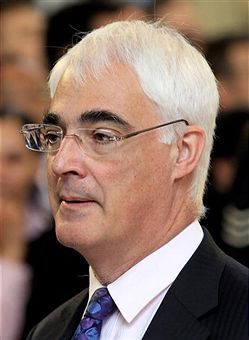 Alistair Darling has been on Sky News doing a lap of honour for today’s GDP growth
figures. “Vindicates everything we did,” he said – his narrative being that the extra debt did indeed boost the economy and produced 1.1 percent growth in this quarter. This chimes with
what I wrote in the Daily Telegraph a few weeks ago: that the
economy is better, not worse, than the Tories thought. Even if, or should I say when, the ONS say the figure was wrong and needs to be revised downwards it will still mean tax revenue churning in
at a far faster rate than thought. This will give Osborne a get-out clause if he wants to go softer on the cuts, or the tax rises (any adjustment would have to be consistent with his 80/20 split
between cuts and taxes).
Alistair Darling has been on Sky News doing a lap of honour for today’s GDP growth
figures. “Vindicates everything we did,” he said – his narrative being that the extra debt did indeed boost the economy and produced 1.1 percent growth in this quarter. This chimes with
what I wrote in the Daily Telegraph a few weeks ago: that the
economy is better, not worse, than the Tories thought. Even if, or should I say when, the ONS say the figure was wrong and needs to be revised downwards it will still mean tax revenue churning in
at a far faster rate than thought. This will give Osborne a get-out clause if he wants to go softer on the cuts, or the tax rises (any adjustment would have to be consistent with his 80/20 split
between cuts and taxes).
But more importantly, is Darling right? Well, 0.2 percent of the 1.1 percent growth was from the private sector, so it seems that low interest rates and cheap money is primarily responsible. A 7 percent boom in construction can also be explained, at least in part, by government contracts – so Darling may have a bit of a point there. But it doens’t explain the 1.3 percent rise in business & finance services growth. All told, tax revenues are up 7 percent. But – crucially – debt interest payments last month were 123 percent higher than they were in June 2009. This is a figure I suspect you won’t see reported in many newspapers tomorrow, because reporters are taught to ignore such metrics. This is a major flaw in financial journalism, in my opinion, and explains why Brown got away with what he did for so long. Debt interest payments – the root cause of the cuts – are always airbrushed out of any report on the economy.
But here’s the real question. Is the cheap money another debt-fuelled illusion? Are we repeating the mistake of the Greenspan plan in 2001, basically borrowing our way out of debt? It’s a question commentators don’t like to address, because it’s far nicer to believe the growth is real. It will, however, take another two quarters of data to reach any firm conclusion on whether these green shoots are real, or illusory.
Osborne should, in my view, hold firm and keep the deficit reduction going down: this is what will assure the low interest rates which are the surest provider of growth. But he will face mounting pressure to soften his stance if the economy keeps getting better than we thought. CitiGroup has released (below) a graph showing its expectations for the deficit (in green) which are far more benign than the consensus.








Comments